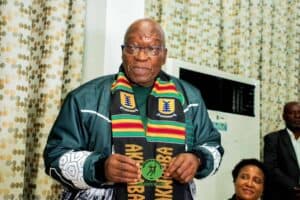Of nearly 37 million eligible voters, only 26.7 million bothered to register and with about 70% voter turnout expected, that boils down to 19 million crosses.

The sad reality of SA’s political arithmetic is that tomorrow one out of every three people will decide the fate of the other two.
Of nearly 37 million eligible voters, only 26.7 million are registered and with about 70% voter turnout expected nationally, there’s a good chance the only person making a difference in the direction South Africa takes after tomorrow’s election is – you.
About 19 million voters are expected to turn out tomorrow, and will set the course for the other 39 million people in the country.
It’s a similar scenario to the last national elections.
“In 2014, the country’s population was estimated at 54 million, so 34% – or just over a third of the people living in South Africa – helped choose the country’s government in the previous elections,” said fact-checking organisation Africa Check.
And based on the Institute of Race Relations’ (IRR) “not a predication” survey, it is voter turnout which will make the difference.
“It is not possible to precisely predict the election result,” said IRR head of politics and governance Gareth van Onselen at the release of the IRR’s Criterion Report, which only covered Gauteng, KwaZulu-Natal and the Western Cape, due to financial constraints.
“The last few days will likely see some small movement. If history is a guide, it will be towards the bigger parties,” Van Onselen said. “But we leave the art of prediction up to you, the public.”
In a nutshell, the report suggested the ANC “could get less than 55%, depending on the last four days, turnout and taking into account the margin of error”, Gauteng and KwaZulu-Natal could be hung, with the DA holding the Western Cape despite being down among white voters, and the Economic Freedom Fighters being up “significantly” since 2014.
The IRR has estimated a 70% turnout nationally, down on the 74.6% turnout of 2014.
“The IRR poll – if accurate – will shake SA politics in creating a very vulnerable and marginal ANC at both national and provincial level,” said political analyst Daniel Silke.
Silke noted the poor voter registration in the 18- to 20-year-old age group, and argued the low poll numbers were a reflection of how poor the youth registration was.
“The problem is the younger voters have been alienated from the registration process and, no doubt, also alienated from the broader political process, given the frustrations about the economy and jobs.
“All the various other issues create a frustration, rather than an eagerness to participate in the actual electoral process,” Silke said.
“The ANC will be under tremendous strain as a result of a weakened election result if the poll is accurate. From my point of view if the ANC receives below 55% nationally, this will be a cause of great internal strain and potential ructions within it as the party attempts to find a scapegoat.”
However, the IRR report’s end date was last Friday, before the rallies held by the ANC, Democratic Alliance, and EFF where tens of thousands of supporters gathered to hear their leaders – which ultimately leaves the results in the voters’ hands.
For more news your way, download The Citizen’s app for iOS and Android.






